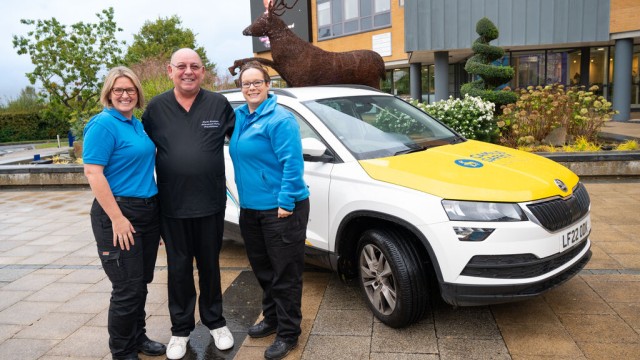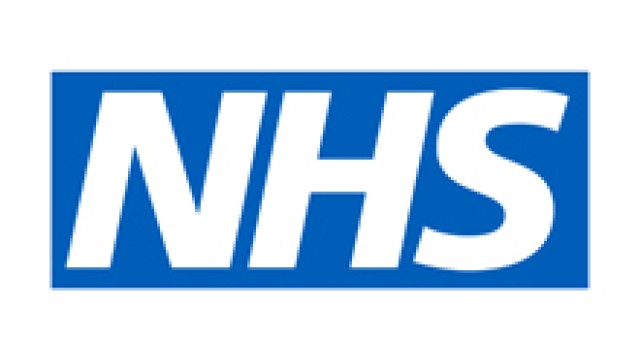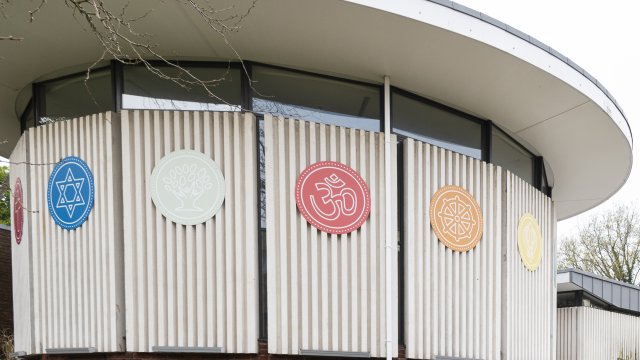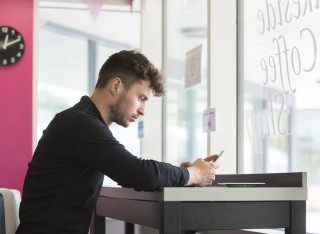

Support
The University of Surrey offers support and advice to all those who need it. There are also external support options available to you.
What support is on offer?
If you, or someone you know, have experienced bullying, harassment or sexual misconduct, there are a variety of support options available to both students and staff.
This support is available to any member of the University involved in an incident, including reporting parties, responding parties and witnesses,
- This applies all the time and not just during an investigation or decision-making process.
- This applies even if no formal report is made.
- This applies even if the incident did not occur on University premises or in connection with a student’s registration.
Support options for students
The Centre for Wellbeing offers a range of pastoral services to ensure that our students feel well and supported throughout their time at the University. Details on how to register with the centre and how to book appointments with the team can be found on the Centre for Wellbeing webpage.
The University’s dedicated Disability and Neuroinclusion Service can provide advice, guidance, and support to students about a range of practical adjustments to your studies and student experience. Details on how to register with the centre and how to book appointments with the team can be found on the disability and neuroinclusion webpage.
Our Sexual Violence Liaison Officers (SVLOs) are trained in taking disclosures of historic or new incidents of sexual violence and are equipped to provide you with the support you need. The role of the SVLO is to support you and to listen empathically and without judgement. You can tell an SVLO as much or as little as you want to about what happened, and in your own time. You can with book to speak with an SVLO using our booking system, or email the team at svlo@surrey.ac.uk.
Your personal tutor is there to support your academic, personal and professional development throughout your time at Surrey. They will refer you to appropriate academic, welfare and support services when necessary. Tutors follow a code of practice for personal tutoring to ensure they are delivering the best possible help to you.
If you feel your studies have been affected by what has happened you can consider applying for extenuating circumstances (ECs). Details on how to apply for an EC can be found on our extenuating circumstances webpage.
If you feel your studies have been affected by what has happened, you can consider applying for a temporary withdrawal: from studies. You may wish to discuss this option with your personal tutor. If you are a PGR student, further help and advice can be found by contacting the Research Degrees Office.
University of Surrey Students Union (USSU) is a free confidential, impartial service where students can get advice and information on academic and personal issues, including advice on procedures and representation at meetings.
Support options for staff
Advisory, Conciliation and Arbitration Service (ACAS) provides free and impartial information and advice to employers and employees on all aspects of workplace relations and employment law.
Our Employee Assistance Programme (BHSF RISE) gives staff access to free personalised, on-demand advice and support from a team of mental health, financial and legal experts, 24 hours a day, 365 days a year. You will only be able to access our SurreyNet page if you are a member of staff.
If you are a member of staff or manager, your Human Resources (HR) contact will be able to identify the support that is available to you. You will only be able to access our SurreyNet page if you are a member of staff.
Cordell Health, our Occupation Health provider, deliver a range of occupational health services including absence management, health surveillance, health screening, workstation assessments, policy design, on-site assistance/clinics, disability at work, and health promotion.
There are three recognised trade unions that represent staff at the University: Unison, Unite, and UCU. Trade unions are organised groups of workers who come together to support each other in the workplace, negotiating with employers to improve pay, terms and conditions and ensure fair and equal treatment. Unions provide members with individual advice and representation. You will only be able to access our SurreyNet page if you are a member of staff.
The Rainbow Network exists to further equality for LGBTQIA+ (lesbian, gay, bi-sexual, transgender, queer, intersex, asexual, plus) staff, students and the wider LGBTQIA+ community. The group helps to formulate and advise University initiatives to encourage greater representation of the LGBTQI+ community in all areas of university life. You will only be able to access our SurreyNet page if you are a member of staff.
Rainbow Allies is a group of staff and students who show their commitment to the LGBTQIA+ (lesbian, gay, bi-sexual, transgender, queer, intersex, plus) Community here at Surrey by agreeing to a number of pledges and demonstrating their support to the community. You will only be able to access our SurreyNet page if you are a member of staff.
Other sources of support
You can also access support from a variety of local and national support networks in the UK.
Citizens Advice provides some useful information on the different types of harassment and hate crime people may experience including disability hate crime, racist and religious hate crime, sexual harassment, and sexual orientation and transgender identity hate crime.
The Cyber Helpline provides free, expert help for victims of cybercrime and online harm.
Citizens Advice provides some useful information on the different types of discrimination people may experience including disability hate crime, racist and religious hate crime, harassment, and sexual orientation and transgender identity hate crime.
Stop Hate UK is a leading national organisation working to challenge all forms of hate crime and discrimination.
Tell MAMA supports victims of anti-Muslim hate and is a public service which also measures and monitors anti-Muslim incidents.
Galop is a national charity that provides advice and support to members of the LGBT+ community.
Crimestoppers is a national charity with a free helpline for reporting crime anonymously.
Community Security Trust helps those who are victims of anti-Semitic hatred, harassment or bias.
Victim Support helps anyone who has been the victim of a crime. They can support you coping with the after-effects of crime and help with reporting to the police. When you report a crime to the police, they should automatically ask you if you would like help from an organisation like Victim Support. But anyone affected by crime can contact them directly – you do not need to talk to the police to get Victim Support help.
Sinophobia: the first document is in English and helps staff and students understand what Sinophobia is, how to prevent it and what to do to support others who are at risk of it. The second document is in Chinese, aimed at Chinese-speaking students from across the Chinese diaspora community to give them support if and when they need it. It will also help them understand the different forms of Sinophobia, what to do if they experience it and how they can use Report + Support to report incidents.
The Cyber Helpline provides free, expert help for victims of cybercrime and online harm.
i-access Drug and Alcohol Services provides specialist assessment, support and treatment to people who want help with their regular drug use and to those who are highly dependent on alcohol and want to stop drinking.
Surrey Drug and Alcohol Care is a 24-hour manned confidential help line giving support and information to drug and alcohol users, their families and friends. They can refer callers into treatment services.
Citizens Advice provides some useful information on the different types of harassment and hate crime people may experience including disability hate crime, racist and religious hate crime, harassment, and sexual orientation and transgender identity hate crime.
True Vision offers guidance on reporting hate crime and hate incidents. If you do not wish to talk to anyone in person about the incident or wish to remain anonymous, there is an online form for reporting hate crime; you can report non-crime hate incidents to the police to try and prevent any escalation in seriousness.
Stop Hate UK is a leading national organisation working to challenge all forms of hate crime and discrimination.
Tell MAMA supports victims of anti-Muslim hate and is a public service which also measures and monitors anti-Muslim incidents.
Galop is a national charity that provides advice and support to members of the LGBT+ community. Their national helpline for LGBT+ victims and survivors of abuse and violence is +44(0) 800 999 5428.
Crimestoppers is a national charity with a free helpline for reporting crime anonymously.
Community Security Trust helps those who are victims of anti-Semitic hatred, harassment or bias.
Victim Support helps anyone who has been the victim of a crime. They can support you coping with the after-effects of crime and help with reporting to the police. When you report a crime to the police, they should automatically ask you if you would like help from an organisation like Victim Support. But anyone affected by crime can contact them directly – you do not need to talk to the police to get Victim Support help.
Revenge Porn Helpline supports adult victims of intimate image abuse who live in the UK. It provides advice, guidance and support with helping to remove intimate content which has been non-consensually shared online.
Sinophobia: the first document is in English and helps staff and students understand what Sinophobia is, how to prevent it and what to do to support others who are at risk of it. The second document is in Chinese, aimed at Chinese-speaking students from across the Chinese diaspora community to give them support if and when they need it. It will also help them understand the different forms of Sinophobia, what to do if they experience it and how they can use Report + Support to report incidents.
The Cyber Helpline provides free, expert help for victims of cybercrime and online harm.
Mental Health Crisis Line is open 365 days a year, 24 hours a day and can be reached on +44(0) 800 915 4644.
Samaritans is a charity dedicated to reducing feelings of isolation and disconnection that can lead to suicide. You can call them on +44 (0) 1483 116 123 or 116 123.
NHS 111: Call 111 (24 hours a day, 365 days per year).
Safe Haven drop-in centre is available for people experiencing a mental health crisis. Open 6pm – 11pm, 7 days a week, 365 days of the year at: 101 Walnut Tree Close, Guildford GU1 4UQ.
HOPEline247 is a confidential support line for students who are having thoughts of suicide. You can call on +44(0) 800 068 4141, or text 88247.
Togetherall provides free, anonymous and non-judgemental online environment supporting your mental health and wellbeing. The services offer support for a wide range of issues, including anxiety, depression, stress, trauma, relationship problems and lifestyle challenges.
Anxiety UK offers support, advice and information on a range of anxiety and anxiety-based depression conditions. You can call on +44(0) 8444 775 774. Lines are open Monday to Friday, 9:30am – 5:30pm.
Oakleaf is a mental health charity in Surrey working as a social enterprise to provide vocational training for those suffering from mental health issues.
NHS 111: Call 111 (24 hours a day, 365 days per year).
If your injuries are severe, go to your nearest Accident and Emergency department. If you are on the University’s campuses, the local A&E department for Guildford is Royal Surrey County Hospital, Egerton Road GU2 7XX, 01483 571122 (next to Tesco).
Victim Support helps anyone who has been the victim of a crime. They can support you coping with the after-effects of crime and help with reporting to the police. When you report a crime to the police, they should automatically ask you if you would like help from an organisation like Victim Support. But anyone affected by crime can contact them directly – you do not need to talk to the police to get Victim Support help.
Women’s Aid provides support for women and children in domestic abuse situations. They are mindful of those who may be in isolation with abusive partners during this time.
Respect: Men's Advice Line is a confidential helpline for men experiencing domestic violence. You can call on +44(0) 808 801 0327.
Mankind provides a confidential helpline available for all men across the UK suffering from domestic violence or domestic abuse by their current or former wife or partner (including same-sex partner). You can call on +44(0) 1823 334 244 10am – 4pm, Monday to Friday.
Next Link provides crisis support and temporary supported housing for women and children experiencing abuse. You can call on +44(0) 800 4700 280 8.30am – 5.30pm (Monday to Friday), 9.30am – 1pm (Saturday).
Refuge provides domestic abuse support for women and children. You can call on +44(0) 808 2000 247 for confidential advice 24/7.
Victim Support helps anyone who has been the victim of a crime. They can support you coping with the after-effects of crime and help with reporting to the police. When you report a crime to the police, they should automatically ask you if you would like help from an organisation like Victim Support. But anyone affected by crime can contact them directly – you do not need to talk to the police to get Victim Support help.
Galop is a national charity that provides advice and support to members of the LGBT+ community. Their national helpline for LGBT+ victims and survivors of abuse and violence is +44(0) 800 999 5428.
Healthy Surrey provides elf-care information, as well as signposting to local health and wellbeing services available to you as a Surrey resident. You can call their domestic abuse hotline on +44(0) 1483 776822 9am – 9pm, 7 days a week.
Revenge Porn Helpline supports adult victims of intimate image abuse who live in the UK. It provides advice, guidance and support with helping to remove intimate content which has been non-consensually shared online.
SafeLives is a UK-wide charity dedicated to ending domestic abuse, for everyone and for good.
Karma Nirvana is a specialist charity that supports people affected by honour-based abuse.
Cifas is the UK's fraud prevention community. For over 30 years they have worked with hundreds of organisations to stop fraud, and their community is made up organisations from across the sectors, including most banks, credit providers and telecommunication companies, who join Cifas as members.
The Cyber Helpline provides free, expert help for victims of cybercrime and online harm.
Rape and Sexual Abuse Support Centre (RASASC) work with anyone in Surrey whose life has been affected by rape or sexual abuse, whether recently or in the past. You can call +44(0) 1483 568 000 9am – 4.30pm, Monday to Friday .
The Surrey Solace Centre (SARC) offers free support and practical help to anyone in Surrey who has experienced sexual violence and/or abuse. The SARC offers counselling, emotional support and ISVAs (Independent Sexual Violence Advisors). The SARC will, with your consent, also obtain and preserve forensic evidence for up to 2 years for you, with no obligation to report to the police or the University. You can call them free on +44(0) 300 130 3038 or find out more on The Solace Centre home page.
If you feel you need to visit the SARC, the Students’ Union and University are able to pay the costs of your taxi fare. Please email the Centre for Wellbeing with your name and bank details, then attach proof of your journey such as a receipt or taxi screenshot.
Galop is a national charity that provides advice and support to members of the LGBT+ community. Their national helpline for LGBT+ victims and survivors of abuse and violence is +44(0) 800 999 5428.
The National Stalking Helpline can give you information and advice on support and options available to you. You can call on +44(0) 808 802 0300, 9.30am – 8pm, Monday and Wednesday; 9.30am – 4pm, Tuesday, Thursday and Friday.
Respect: Men's Advice Line is a confidential helpline for men experiencing domestic violence. You can call on +44(0) 808 801 0327.
Victim Support helps anyone who has been the victim of a crime. They can support you coping with the after-effects of crime and help with reporting to the police. When you report a crime to the police, they should automatically ask you if you would like help from an organisation like Victim Support. But anyone affected by crime can contact them directly – you do not need to talk to the police to get Victim Support help.
Survivors UK supports and helps male and non-binary survivors of sexual violence including counselling and therapy appointments as well as online chat. You can call them on +44(0) 20 3598 3898.
Revenge Porn Helpline supports adult victims of intimate image abuse who live in the UK. It provides advice, guidance and support with helping to remove intimate content which has been non-consensually shared online.
The National Stalking Helpline can give you information and advice on support and options available to you. You can call on +44(0) 808 802 0300, 9.30am – 8pm, Monday and Wednesday; 9.30am – 4pm, Tuesday, Thursday and Friday.
The Suzy Lamplugh Trust, who runs the National Stalking Helpline, provides stalking information and support services.
Paladin Service supports high-risk victims of stalking with their specialist independent stalking advocacy caseworkers and makes sure local protection is available for victims.
Protection Against Stalking provides advice and support for people who are victims of stalking.
Victim Support helps anyone who has been the victim of a crime. They can support you coping with the after-effects of crime and help with reporting to the police. When you report a crime to the police, they should automatically ask you if you would like help from an organisation like Victim Support. But anyone affected by crime can contact them directly – you do not need to talk to the police to get Victim Support help.
Revenge Porn Helpline supports adult victims of intimate image abuse who live in the UK. It provides advice, guidance and support with helping to remove intimate content which has been non-consensually shared online.
The Cyber Helpline provides free, expert help for victims of cybercrime and online harm.





